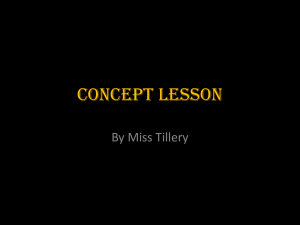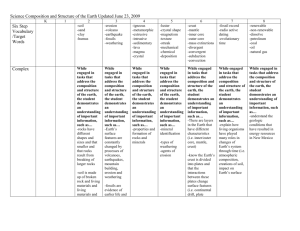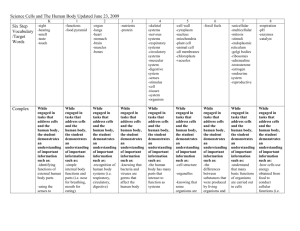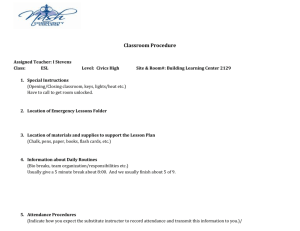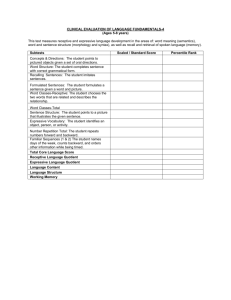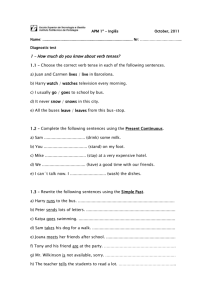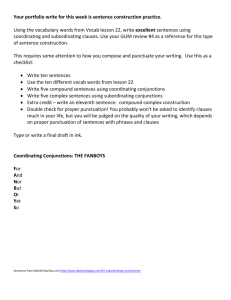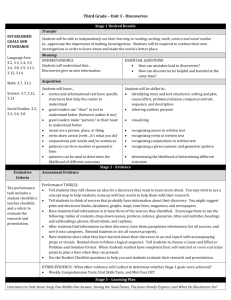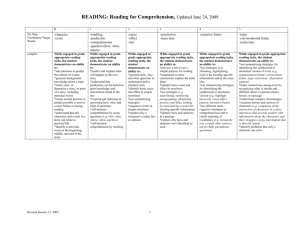Language Conventions rev
advertisement
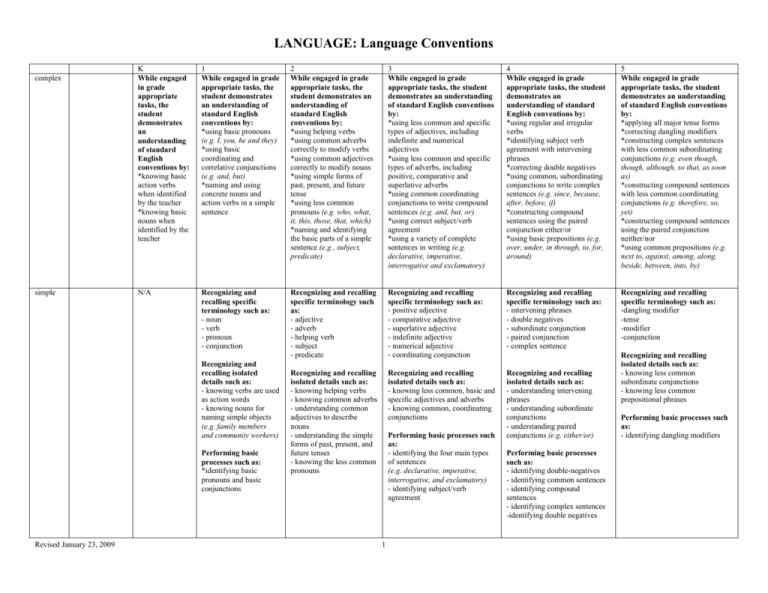
LANGUAGE: Language Conventions complex simple K While engaged in grade appropriate tasks, the student demonstrates an understanding of standard English conventions by: *knowing basic action verbs when identified by the teacher *knowing basic nouns when identified by the teacher 1 While engaged in grade appropriate tasks, the student demonstrates an understanding of standard English conventions by: *using basic pronouns (e.g. I, you, he and they) *using basic coordinating and correlative conjunctions (e.g. and, but) *naming and using concrete nouns and action verbs in a simple sentence 2 While engaged in grade appropriate tasks, the student demonstrates an understanding of standard English conventions by: *using helping verbs *using common adverbs correctly to modify verbs *using common adjectives correctly to modify nouns *using simple forms of past, present, and future tense *using less common pronouns (e.g. who, what, it, this, those, that, which) *naming and identifying the basic parts of a simple sentence (e.g., subject, predicate) 3 While engaged in grade appropriate tasks, the student demonstrates an understanding of standard English conventions by: *using less common and specific types of adjectives, including indefinite and numerical adjectives *using less common and specific types of adverbs, including positive, comparative and superlative adverbs *using common coordinating conjunctions to write compound sentences (e.g. and, but, or) *using correct subject/verb agreement *using a variety of complete sentences in writing (e.g. declarative, imperative, interrogative and exclamatory) 4 While engaged in grade appropriate tasks, the student demonstrates an understanding of standard English conventions by: *using regular and irregular verbs *identifying subject verb agreement with intervening phrases *correcting double negatives *using common, subordinating conjunctions to write complex sentences (e.g. since, because, after, before, if) *constructing compound sentences using the paired conjunction either/or *using basic prepositions (e.g. over, under, in through, to, for, around) 5 While engaged in grade appropriate tasks, the student demonstrates an understanding of standard English conventions by: *applying all major tense forms *correcting dangling modifiers *constructing complex sentences with less common subordinating conjunctions (e.g. even though, though, although, so that, as soon as) *constructing compound sentences with less common coordinating conjunctions (e.g. therefore, so, yet) *constructing compound sentences using the paired conjunction neither/nor *using common prepositions (e.g. next to, against, among, along, beside, between, into, by) N/A Recognizing and recalling specific terminology such as: - noun - verb - pronoun - conjunction Recognizing and recalling specific terminology such as: - adjective - adverb - helping verb - subject - predicate Recognizing and recalling specific terminology such as: - positive adjective - comparative adjective - superlative adjective - indefinite adjective - numerical adjective - coordinating conjunction Recognizing and recalling specific terminology such as: - intervening phrases - double negatives - subordinate conjunction - paired conjunction - complex sentence Recognizing and recalling specific terminology such as: -dangling modifier -tense -modifier -conjunction Recognizing and recalling isolated details such as: - knowing helping verbs - knowing common adverbs - understanding common adjectives to describe nouns - understanding the simple forms of past, present, and future tenses - knowing the less common pronouns Recognizing and recalling isolated details such as: - knowing less common, basic and specific adjectives and adverbs - knowing common, coordinating conjunctions Recognizing and recalling isolated details such as: - understanding intervening phrases - understanding subordinate conjunctions - understanding paired conjunctions (e.g. either/or) Recognizing and recalling isolated details such as: - knowing verbs are used as action words - knowing nouns for naming simple objects (e.g. family members and community workers) Performing basic processes such as: *identifying basic pronouns and basic conjunctions Revised January 23, 2009 Performing basic processes such as: - identifying the four main types of sentences (e.g. declarative, imperative, interrogative, and exclamatory) - identifying subject/verb agreement 1 Performing basic processes such as: - identifying double-negatives - identifying common sentences - identifying compound sentences - identifying complex sentences -identifying double negatives Recognizing and recalling isolated details such as: - knowing less common subordinate conjunctions - knowing less common prepositional phrases Performing basic processes such as: - identifying dangling modifiers LANGUAGE: Language Conventions complex 6 7 8 9 While engaged in grade appropriate tasks, the student demonstrates an understanding of standard English conventions by: *using verbs that agree with compound subjects *using indefinite pronouns *using present perfect, past perfect, and future perfect tenses *constructing common compound-complex sentences (e.g. constructing sentences with two independent clauses and one subordinating clause) *using less common prepositional phrases While engaged in grade appropriate tasks, the student demonstrates an understanding of standard English conventions by: *using modifiers *using active and passive voice consistently *using infinitives and participles *clarifying references between pronouns and antecedents *using all parts of speech *using all types and structures of sentences *using progressive verb tenses While engaged in grade appropriate tasks, the student demonstrates an understanding of standard English conventions by: *constructing varied sentence types *using varied sentence openings *using apposition within sentences *demonstrating consistent use of all tense forms While engaged in grade appropriate tasks, the student demonstrates an understanding of standard English conventions by: *using parallel structure Revised January 23, 2009 2 10 11 12 N/A N/A N/A PreAP 9 While engaged in grade appropriate tasks, the student demonstrates an understanding of standard English conventions by: *using parallel structure PreAP 10 AP 11 AP 12 N/A N/A N/A LANGUAGE: Language Conventions simple Recognizing and recalling specific terminology such as: - compound subject - clause - independent clause - subordinating clause - indefinite pronoun Recognizing and recalling isolated details such as: - understanding subject/verb agreement with a compound subject - understanding the elements of compound-complex sentences -knowing less common prepositions - understanding the use of present-perfect, past-perfect, and future-perfect verb tenses Revised January 23, 2009 Recognizing and recalling specific terminology such as: Recognizing and recalling specific terminology such as: - infinitives - participles -antecedent -progressive verb tenses Recognizing and recalling isolated details such as: - understanding the use of modifiers - understanding active and passive voice Performing basic processes such as: -identifying infinitives and participles - identifying antecedents - identifying progressive verb tenses Recognizing and recalling specific terminology such as: - apposition - subordination - coordination Recognizing and recalling isolated details such as: - parallel structure N/A Recognizing and recalling isolated details such as: - understanding the consistent use of tense - understanding the relationships between ideas using subordination, coordination, and apposition Performing basic processes such as: - identifying varied sentence openings 3 N/A N/A Recognizing and recalling isolated details such as: - parallel structure N/A N/A N/A
